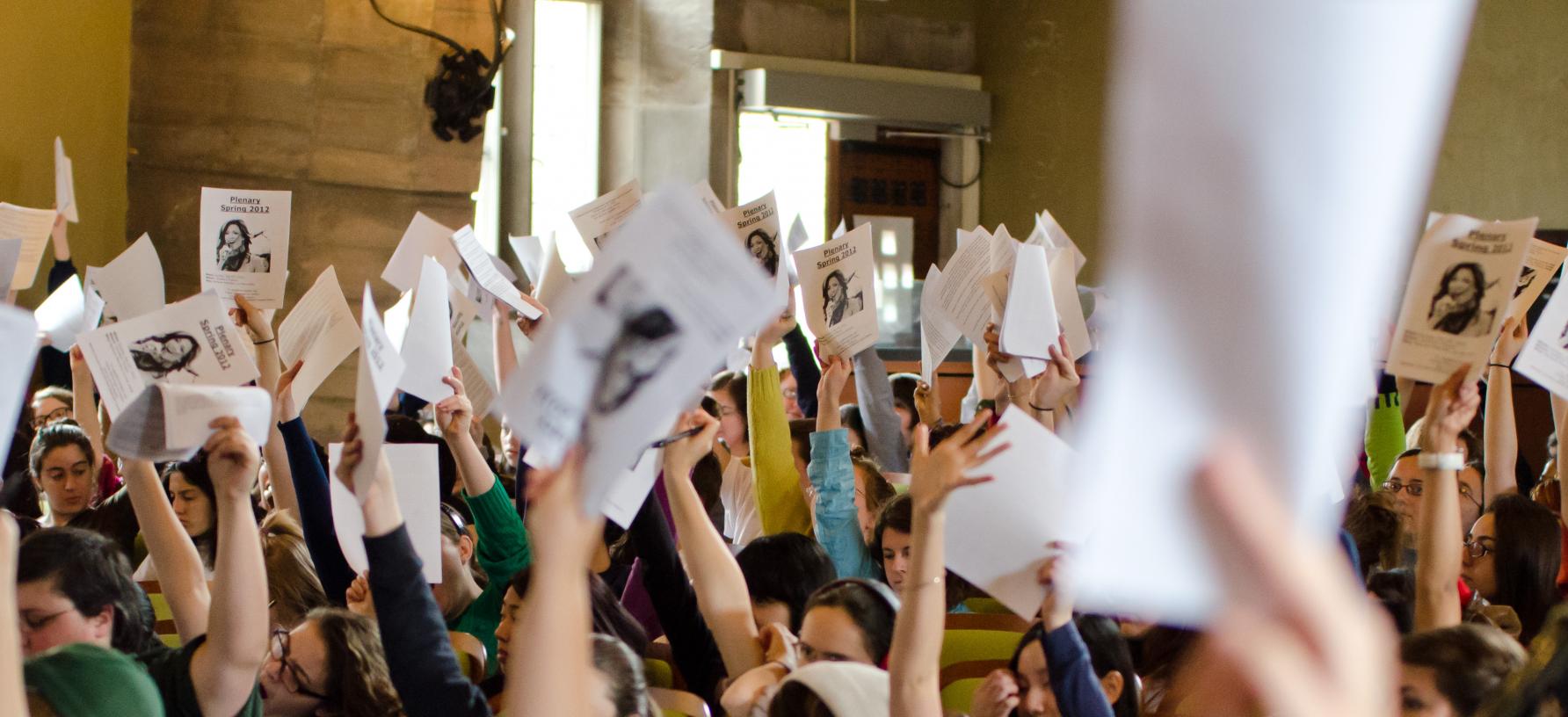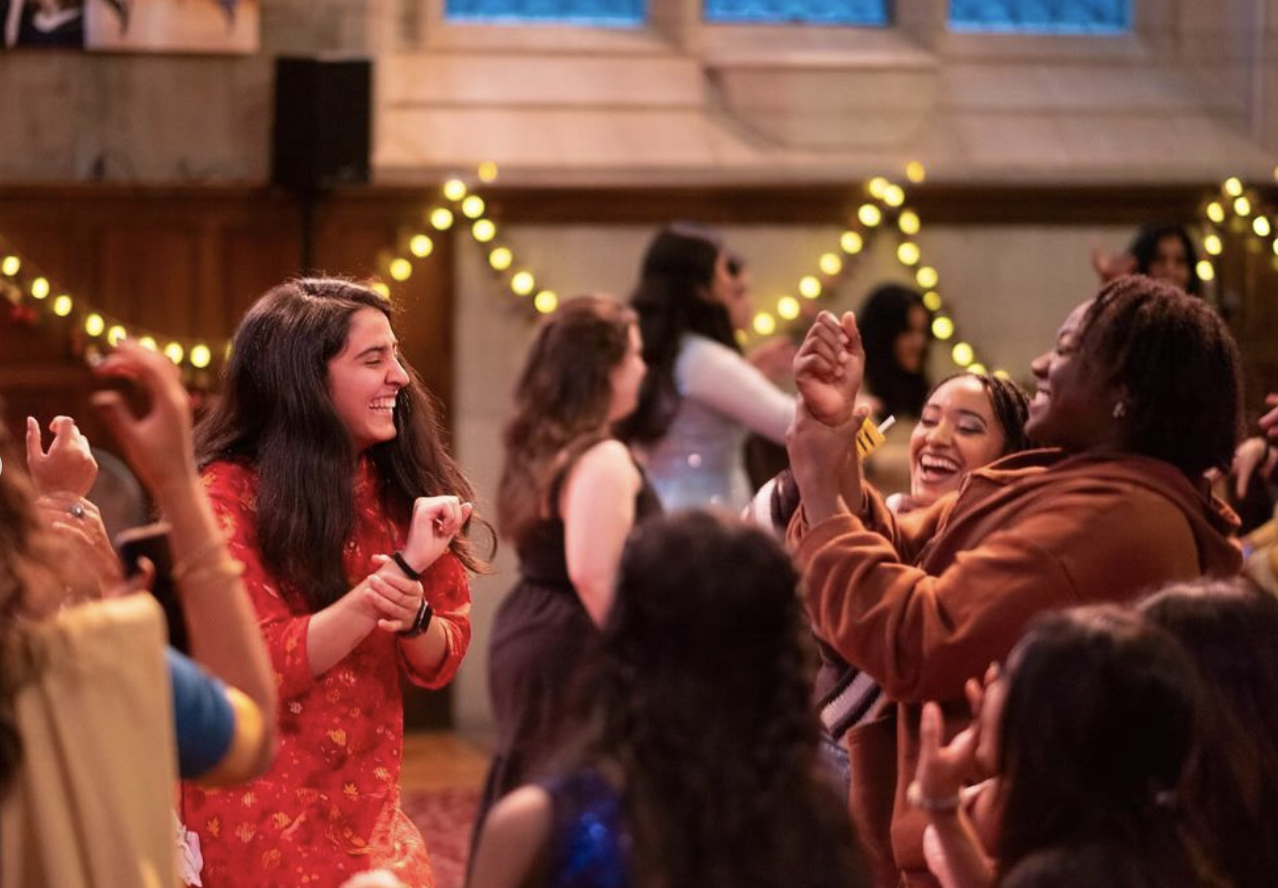By Elle Thompson, Staff Editor
At long last, Bryn Mawr’s fall 2020 Plenary is underway.
After a delay for the strike, plenary this semester will be taking place digitally. Resolutions will be presented via video on a Moodle course, and voting will last from Monday, December 7 at 9 a.m. until 11:59 p.m. on Friday night. The plenary will be Fire-Nation themed, an homage to the show Avatar: The Last Airbender. Typically, plenary takes place in Goodhart Hall, requiring a quorum of one-third of the student body to even begin. This year, Bryn Mawr will reach quorum via voting, with one-third of the student body needed to vote to pass any of the three resolutions.
The Resolutions
The first resolution focuses on accessible transportation, and is authored by Laura Rodgers ‘22, Megan Petero ‘22, and Katherine Santarpia ‘22. It proposes that “accessible vehicles will be purchased and or modified to ensure that all transportation services provided to the Bryn Mawr community are available to students with disabilities.” The resolution, a carryover from Spring 2020, points out that Bryn Mawr’s primary vehicles are generally inaccessible, with students lacking training on how to accommodate disabled students. Santarpia told The Bi-College News that “Resources that exist for and serve the Bryn Mawr community need to do just that—exist for and serve all at Bryn Mawr, with no asterisks or caveats.” Without accessible transportation, Rodgers, who uses a wheelchair, cannot easily travel within the Bi-Co: “Let Betty [her chair] go to Haverford!” she commented.
This resolution on making Bryn Mawr more structurally accessible echoes themes of both last year’s Mawrtyrs For Accesibility sessions and the November Bryn Mawr strike, which demanded the college invest $500,000 in health and wellness services to improve accessibility on campus. In response, the school promised to improve accessibility in the Park Science Center, replace the Old Library elevator, and improve wheelchair accessibility to Erdman Dining Hall and Rhoads North. In November, the Strike Collective, now called the Black Student Liberatory Coalition, gave this response a grade of C. The BSLC stated that, among other concerns, the resolution failed to include plans to make buildings such as Taylor Hall, English House, and Russian House accessible.
The second resolution regarding consideration of religious holidays for students is presented by Stephanie Lichtenstein ‘23, Tillie Rippin ‘23, and Lily Small ‘23. This resolution asks that Bryn Mawr’s academic calendar be amended so that Yom Kippur, Eid ul-Fitr (the end of Ramadan), the first day of Eid al-Adha, and the first day of Rosh Hashanah are class-free days for all students and faculty, including the evening before the class. “It’s a step in the right direction of combating Bryn Mawr’s anti-Semitic history,” explained Lichtenstein.
In the introduction, Rippin described an incident in which two days after Yom Kippur, she was asked to take an exam covering content from that day’s lecture. As Yom Kippur is a day of rest, she was not comfortable studying or attending class on Monday, thus putting her at a sharp disadvantage for a Wednesday test. She was not initially granted an extension. “Professors may not know about the significance of these days to us, so they don’t realize they need to accommodate students observing the holiday,” said Rippin.
Both of these resolutions identified unfulfilled pledges on the Bryn Mawr college website: the first pointed out language emphasizing commitment to equal access for disabled students, and the second pointed out Bryn Mawr’s commitment to allowing students religious worship in peace.
The final resolution, presented by Jennifer Nguyen ‘22, would create a new Wi-Fi network allowing gaming devices to operate on the Bryn Mawr campus. The resolution notes that Haverford has had access to a similar network since 2018. A gaming Wi-Fi network would allow students to “connect in place of the ways we used to that are no longer safe due to COVID-19,” Nguyen said.
One resolution was removed in early October to instead be handled internally. This resolution was to be presented by fall 2020 Sisterhood* Co-Presidents Shaylin Chaney-Williams ‘22 and Bria Nixon ‘22. It asked for consistent funding for the annual Black History Month speaker event. Previously, this event had a yearly cost of $10,000–15,000, but the expectation was that Sisterhood* request money to fund the event, meaning funding was not guaranteed year to year. However, according to a member of SGA, over the summer the administration made several commitments towards further funding, and the Sisterhood* Co-Presidents were satisfied by the changes made.
Making an Impact
In fall 2019, plenary failed after a lost quorum, with only four resolutions passing and five being tabled. Last semester, when plenary also took place remotely, voting quorum was never reached. Indeed, less than ⅓ of the student body participated, according to SGA Co-Treasurer Gabriela Capone ‘22. This resulted in the tabling of six resolutions, one of which is again being presented this semester.
Student participation is an ongoing concern. However, Capone said she will be emailing the student body every day with reminders to vote, and “I will be opening every email with ‘flameo, hotman.’”
This year, just as in any other, it is imperative that students vote at plenary. Bryn Mawr students have demonstrated our willingness to participate in civic change by voting in mass numbers. We have demonstrated their ability to push for change within our institution in standing with striking students. We must continue that energy to our next plenary.
Plenary voting will open Monday at 9 a.m., and will continue till 11:59 p.m. on Friday night. You can read the full text of plenary resolutions here.
Pictured: Bryn Mawr students voting in a past plenary. Image credit: Bryn Mawr College




